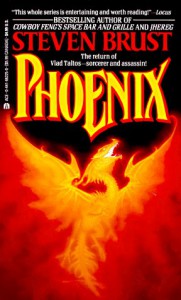Bry's Bountiful Book Blog

Another very satisfying book in the Vlad Taltos series by Steven Brust. This one picks up pretty soon after the end of Teckla and a large portion of the happenings of this book involve the social and political events introduced in that one; namely, the leftist peasant revolt brewing amongst the Teckla (the agrarian worker class of Dragaeran society) and the Easterners (humans). These events, however, don't dominate the plot of the novel but instead form a backdrop against which the plot occurs. This was a neat and tidy way for Brust to include a nod to his personal politics and also keep continuity with his earlier books without sacrificing the integrity or stand-alone nature of the plot of this novel. He did this quite well here.
The actual events that this book focuses on are the ongoing dissolution of Vlad's marriage and the schism that forms between Vlad and his House, the Jhereg. In large part, this split is caused by Vlad's loyalty toward his estranged wife, although in truth Vlad had always been an outsider, even amongst the ranks of the Organization to which he belonged. In this way, this is sort of a book about divorces, as Vlad grapples with falling out of love with both his wife and the profession of an assassin. The latter issue presents Vlad with moral challenges which Brust illustrates well. The problems in Taltos' marriage were largely presented in Teckla, and in this book Vlad and Cawti had pretty much reached the stage of acceptance, although there are still a number of wonderfully uncomfortable scenes which the two of them share throughout the novel. These two themes - the end of a romantic relationship and disillusionment with a lifestyle of violence - are very unusual topics for a sword & sorcery novel, and I appreciate Brust's contravention of genre norms.
The only real issue I had with this book was that it seemed like Brust was in a hurry to wrap things up at the end, and the conclusion of the war with Greenaere seemed somewhat rushed. The events in the Vlad Taltos books often move quickly and the plots tend to be packed with incident, and in such short books this could, in the hands of a lesser writer, lead to slipshod writing or poor pacing. Brust usually avoids this, but toward the end of this book I felt that he crossed that line a little. Still a very good book, though, and I greatly look forward to the next one.
 1
1



